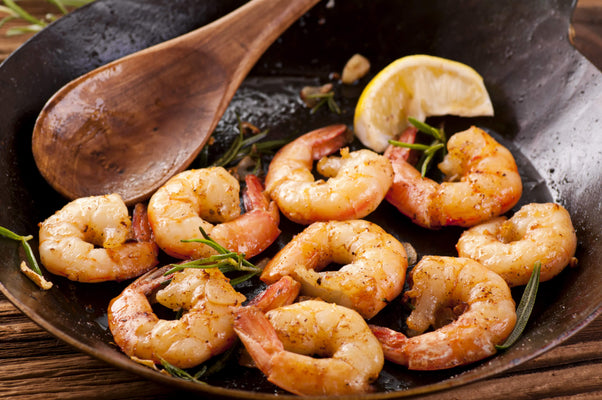Shrimp is a seafood that is popular among people of all religions. Some people think that shrimp can be halal.
According to some religious experts, such as Dr. Abdallah Al-Mouhli, say that because it doesn't contain any ingredients of non-halal origin, it can be considered halal.
But is this really the truth? Is shrimp halal?
Find out more in the next few paragraphs.
Is Shrimp Halal?
If you're a Muslim, then you probably know that there is some debate over whether or not shrimp is halal. Some people say that shrimp is allowed, while others say that it's not. So, what's the verdict?
Well, it really depends on how you look at it. If you consider the fact that shrimp is a seafood, then it would be allowed according to most interpretations of Islamic law. However, if you consider the fact that shrimp is an animal with scales, then it would not be allowed.
So, ultimately, it's up to you to decide whether or not you want to eat shrimp. If you're unsure about it, then you can always ask your local imam for guidance.
Why is Shrimp Halal?
Muslims are often unsure about whether shrimp is halal or haram. The reason for this confusion is that there is some debate amongst Islamic scholars about the classification of shrimp.
Some scholars consider shrimp to be a type of fish, while others consider it to be a type of shellfish. However, the majority of scholars seem to agree that shrimp is halal and can be consumed by Muslims.
There are a few reasons why shrimp is considered halal by most scholars.
Firstly, shrimp is not a predatory animal, so it does not fall into the category of animals that are haram to eat.
Secondly, shrimp is very low in fat and contains no blood, so it meets the requirements of halal food.
Finally, shrimp is a nutritious food that can be beneficial for health, so there is no reason to avoid eating it.
If you are still unsure about whether shrimp is halal or haram, you should consult with a qualified Islamic scholar. In general, however, there is no reason to avoid eating shrimp if you are a Muslim.
What is the Islamic Dietary Law regarding shrimp?
The Islamic Dietary Law, also known as halal, is a set of guidelines that Muslims follow when it comes to food and drink. One of the main principles of halal is that all food must be clean and wholesome. This means that there are certain restrictions on what kinds of foods can be consumed. For example, Muslims are not allowed to eat pork or shellfish.
Shrimp is one type of shellfish that is specifically mentioned in the Quran as being permissible to eat. This is because shrimp is considered to be a clean and wholesome seafood option. In addition, shrimp is a good source of protein and other nutrients.
So, if you're wondering whether or not shrimp is halal, the answer is yes!
Muslims are allowed to consume shrimp as long as it is prepared in a clean and wholesome way.

How to cook shrimp according to halal dietary law?
If you're a Muslim following halal dietary law, you may be wondering how to cook shrimp. While shrimp, like crab, are a type of seafood that is considered halal, there are some things to keep in mind when preparing it.
First, the shrimp must be alive and healthy when caught - this means no frozen or processed shrimp.
The shrimp also must be slaughtered in a way that is consistent with halal guidelines (usually by having its throat cut while saying a prayer).
Once the shrimp is dead, it can be cooked in any way you like - grilled, boiled, fried, etc. Just be sure not to mix it with any non-halal ingredients (pork, alcohol, etc.).
The Benefits of Eating Halal
There are many benefits to eating halal, and one of them is that it is healthier.
Halal meat is often leaner and has less fat than other meats, making it a healthier choice. Halal food is also more likely to be fresh, as it is not allowed to contain preservatives or additives. This means that halal food is often more nutritious and better for you than other types of food.
Another benefit of eating halal is that it is more humane. Animals slaughtered for halal meat are treated with compassion and care, and are not subjected to cruel methods of slaughter. This makes halal meat a more humane option for those who are concerned about the welfare of animals.
Finally, eating halal can help you connect with your faith. For Muslims, eating halal is a way to connect with God and show that you are following His teachings. It can also be a way to connect with other Muslims, as sharing a meal is a great way to build community.
Whether you are Muslim or not, eating halal can be a great way to enjoy delicious, healthy, and humanely-raised food.
Conclusion
From what we have researched, it seems that shrimp is in fact halal according to most Islamic scholars.
However, it is always best to consult your own personal scholar or imam to get a definitive answer.
In general, seafood is considered halal as long as it is not a predatory fish and does not contain any haram ingredients. So next time you're feeling a seafood craving, go ahead and order that shrimp dish!
There are always questions about which foods are halal and which aren't. For example, some flavours of Pringles are halal.
With Chewwies you don’t need to worry about products being halal or not. Because our products are 100% Halal and Kosher and contain no animal products.
It’s always recommended to check the labels, to be 100% sure there are no haram ingredients or ingredients you might not like.


